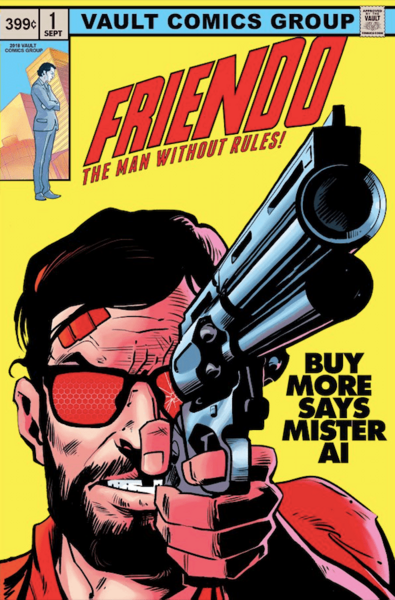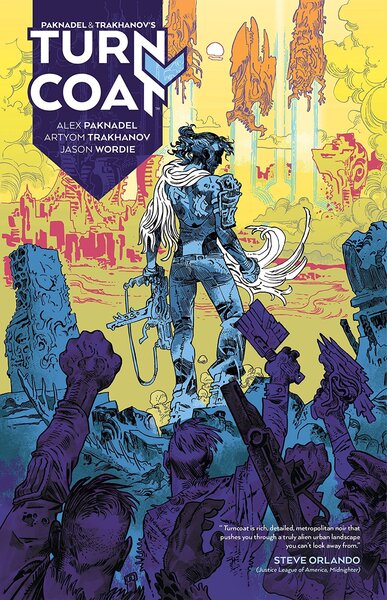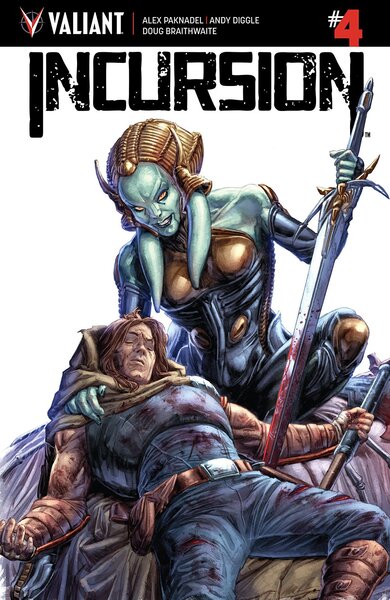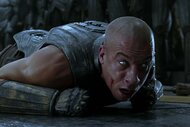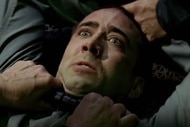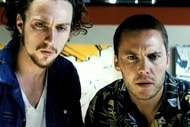Create a free profile to get unlimited access to exclusive videos, sweepstakes, and more!
Indie Comics Spotlight: How to fall into comics 'ass-backwards' with Dr. Alex Paknadel

Looking at Alex Paknadel's body of work, one might think he was influenced by 2000 AD-era Grant Morrison, Simon Bisley, or Alan Moore. However, the British writer actually learned to read by looking at Marvel Treasury Editions with his father. A massive fan of the X-Men, he wanted to follow in Jim Shooter's footsteps and become the youngest Big Two writer ever (Shooter began his career at 14).
Paknadel's comic book career didn't quite happen that quickly, but he never gave up on writing, as he went on to receive a Ph.D. in literature. He also never gave up on his love of comics. But it took his neighborhood friend Andy Diggle (Losers, Daredevil) and a pivotal trip to a convention to convince him to finally take the leap and try his hand at writing them.
That led to his first comic, Arcadia (Boom!), and continued into other projects, including Paknadel & Trakhanov's Turncoat (Boom!); Friendo (Vault), co-written with Martin Simmonds, Dee Cunniffe, and Taylor Esposito; Kino (Lion Forge); and a string of licensed properties in between. Paknadel also co-founded successful comic book collective White Noise along with Dan Watters (Lucifer), Ram V (These Savage Shores, Catwoman), and Ryan O'Sullivan (Fearscape).
There is a pragmatic idealism to his work; every character becomes relatable in some way. Whereas Friendo focuses on the singular, almost suffocating life of a man who runs from religious rigidity into AI-induced materialism, Incursion (Valiant), co-written with Diggle, is epic in scale and tells the tale of a fight to survive against a seemingly omniscient threat actually attempting to consume the planet itself as a resource.
SYFY WIRE caught up with Paknadel and asked him what Diggle said to convince him to finally start writing comics, how literature has always shaped history, and why comics are his weapon of choice.
How did Andy Diggle convince you to write comics?
We used to just sort of sit in bars and I would tell him all of my dumb superhero ideas. Eventually, around 2014, he just lost patience with me and told me, "Look, unless you write any of these ideas down, I don't want to hear them anymore." Just tough love.
So how long after that did it take for you to get published?
It was really crazy. A week later we went to Thought Bubble, which is this big UK comics convention, and Will Dennis was there, and at the time he was group editor at Vertigo. He's launched Jason Aaron, Ollie Masters, and many more talented people.
Andy just sat me down in front of Will and we [discussed some ideas], but because he was on his way out of Vertigo, he couldn't get anything set up there. But he made a call to Boom! I was set up there within a week working on Arcadia, simply because Will's word carries so much weight.
It's awkward sometimes when people ask me what recommendations I can give them for breaking into comics.
Because you didn't do it the traditional way.
Well, there isn't one. Someone said breaking into comics is like breaking out of prison, once that route has been taken, it's bricked up behind you. Some people are super strategic about it. I know people who had a master plan that went off like a Steven Soderbergh movie. I fell into it ass-backward. There are so many ways.
You can save up a bunch of money and do it out of your own pocket, or you can kickstart it. Or you find talented people who will ride or die for you. A friend of mine, Dan Watters (Lucifer), when he worked with Caspar Wijngaard on Limbo (Image), those are two guys who would basically lie down in traffic for each other, that's how that got made. That's the route in that like won't bankrupt, you know?
So since then, almost every year you've had a book. It's been pretty nonstop for you, correct?
Well, and I think it's important to kind of say this, I have a kid and I have a day job. Bills have to be paid. I hope to transition completely, to do this kind of full time. But like right now, it's a lot of late nights. Whatever it takes. This year I seem to kind of found a bit of momentum, but what this does afford me to do is build up a war chest, so I can do a creator-owned book.
Friendo is really intense. Leo is literally controlled and compelled by the AI in his glasses. Did you intend to make such a strong statement about corporations controlling us through technology and advertising?
I was working for like a digital marketing company. This was years ago, way before the Cambridge Analytica scandal. But they were using targeting algorithms, mirrored audiences and could even target people off the platform. I remember having a chat with a developer at that time and saying, "Imagine if someone used this for political propaganda." And here we are. I pitched Friendo to Vault, where it gestated for a bit. Then 2016 happened and everything therein.
Were you in the U.S. during the elections that year?
I was in England. But the Brexit referendum was that same year. In terms of releasing the book, we deliberately ran down the clock, because the situation on the ground was changing so much with the 24-hour news cycle and everything and we wanted [our story to reflect that]. I asked Damian and Adrian Wassel to trust us to turn the issues around super quick. We wanted to keep pace with the insanity of the news and to sort of replicate this feeling of [being] overwhelmed. So there were weeks between getting signoff on the script and art and it actually hitting the stands.
As opposed to months.
Exactly. We played everything very close to the wire. [Looking at the volume out now,] I can see that of course there are themes and recurring tropes, but broadly, it was just me screaming into a bucket.
I didn't want to address anything directly, because then it gives it shelf life. Anyone can write a book about a deranged president or an insane populist insurgency, but the thing that I think is going to have a bit more longevity is "What does it feel like when all the oxygen leaves the room and you don't know what's true and what's not anymore? When we have no gravity all of a sudden?"
Turncoat, however, does not take place mid-crisis. Aliens attack, then they leave, and we're left to deal with the aftermath.
Yes. It's set in a post-invasion New York. The aliens have occupied for 300 years, changed our culture entirely, and just left. Their culture is everywhere, but they are not. There was this alien-human hybrid program that they initiated, to improve relations with humanity, but they were rejected by both species. So they were exterminated.
So it's like alien ethnic cleansing.
Now you're getting it. But the idea is that maybe some of them survived and the protagonist Marta Gonsalez is charged with finding any survivors, if indeed there are any. My wife's Irish, and so she has a visceral and direct experience of what it's like to live in a country that, until fairly recently, was under British occupation.
It's the banality of it that I find so fascinating. Walking to school past tanks and the casual militarization of urban space. It's not that you can't survive it. It's that you can. Like that can be so normal and damaging simultaneously.
Even Incursion, as vast and as epic as the story is, brings us into a world that is literally having its resources sucked out of it by an occupying force. Even though these are fantasy stories, they all speak to reality we can relate to.
It has to. Not to put too fine a point on it, but If it doesn't, why bother?
[Comics] have to be entertainment first and foremost, but the one thing that absolutely convinces me of this is [the inevitability of] subtext. You can either exert conscious control over it, or ignore it, but it'll be there. I promise you that in a hundred years, people will be able to infer a lot about our culture from Michael Bay's Transformers movies.
